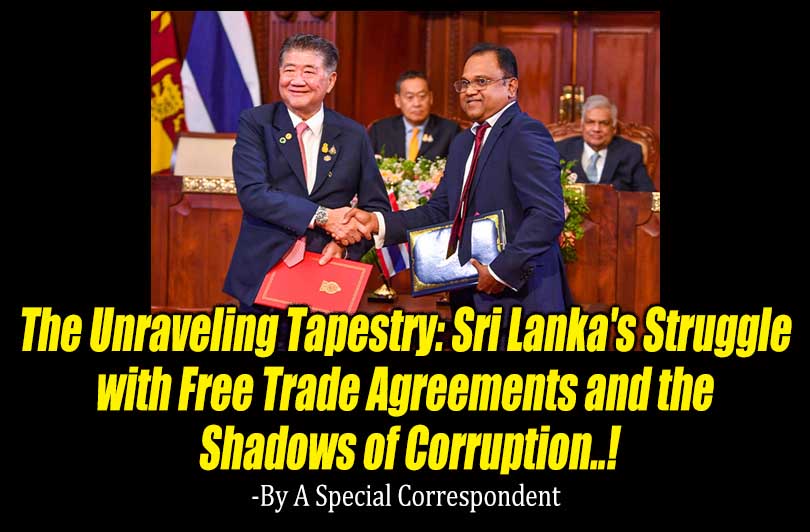-By A Special Correspondent

(Lanka-e-News -06.Feb.2024, 10.45 PM) Sri Lanka's ambitious pursuit of economic prosperity through Free Trade Agreements (FTAs) with multiple nations has faced a daunting challenge – the failure to implement these agreements. This investigative piece unveils the complex web of bureaucratic hurdles, misguided policies, and insidious corruption that have thwarted the realization of these FTAs. From the Indo-Sri Lanka Free Trade Agreement (ISFTA) to the recent Thailand-Sri Lanka Free Trade Agreement, the nation's track record suggests a pervasive struggle in transforming trade agreements into actionable policies.
Sri Lanka's journey in implementing FTAs has been marked by bureaucratic interventions, creating a spectacle of third-world failures. The ISFTA, Pakistan-Sri Lanka Free Trade Agreement (PSFTA), SAARC Preferential Trading Arrangement (SAPTA), and South Asian Free Trade Area (SAFTA) all face practical obstacles. The root cause lies in the continuous changes in regulations by Sri Lankan government officials and customs authorities, driven by self-serving motives.
The commitment to trade facilitation agreements, including the Trade Facilitation Mandate, Generalized System of Preference (GSP), Global System of Trade Preference (GSTP), SAPTA, SAFTA, ISFTA, PSFTA, and Asia-Pacific Trade Agreement (APTA), has been compromised by bureaucratic hurdles, hampering Sri Lanka's ability to derive the intended benefits.
The article underscores the importance of a single-minded focus on growth over redistribution, drawing parallels between the relative success of Malaysia and East Asian nations and the relative failure of Sri Lanka and South Asian countries. The need for public policies that prioritize macroeconomic stability, openness to the world economy, and a favorable domestic business climate is emphasized.
Sri Lanka's industrial policies are scrutinized, revealing a chaotic administration of measures by a complex bureaucracy. The nation retains domestic and trade policy restrictions, hindering rather than facilitating business operations.
The investigation highlights the importance of removing domestic obstacles to doing business and criticizes Sri Lanka for lagging behind in comparison to East Asian countries and advanced Indian states. The unfinished business in domestic, trade-related reforms is identified as a significant hurdle.
The article explores the potential of countries with abundant cheap labor to plug into globalization and achieve fast growth through labor-intensive exports. Sri Lanka's post-1977 scenario is compared with successful cases in China, Hong Kong, and Southeast Asia.
The recently signed Thailand-Sri Lanka Free Trade Agreement is predicted to face challenges due to Sri Lankan authorities' lack of preparation and positivity in implementation. Key agencies like customs and the Export Development Board are deemed unprepared, representing a lost opportunity for Sri Lanka to enter the Thai market.
The investigation exposes the dark side of Sri Lankan businesses as contributors to the difficulties in implementing FTAs. Companies such as Haylee's and Aitken Spence are accused of offering bribes to officials to delay FTA implementations, undermining the nation's economic goals.
Several Sri Lankan politicians and business figures have been caught manipulating FTAs for personal gain. Instances of exporting third-party country origin goods under the guise of being made in Sri Lanka have come to light, revealing a disconcerting trend of exploitation within the FTA facilitation.
In conclusion, Sri Lanka's struggle with implementing FTAs is a multifaceted challenge, involving bureaucratic interventions, inconsistent policies, and corruption. A call for comprehensive reforms echoes throughout the investigation, emphasizing the urgency for Sri Lanka to rectify these issues and unlock the potential benefits of international trade agreements. The nation's economic future hinges on overcoming these hurdles, ensuring that FTAs translate from paper to practice for the benefit of all stakeholders.
---------------------------
by (2024-02-06 18:07:05)
Leave a Reply